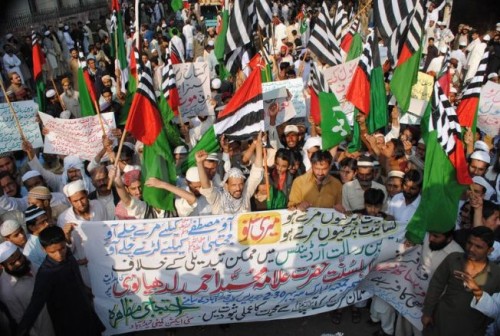The Blasphemy law in Pakistan has, for long, aroused controversy and has been criticized and questioned by human rights activists. Ever since its formulation, it has been used as a tool to spread violence and incite fear specifically among the minorities.
The recent case of Aasia bibi, where a Christian woman had been arraigned on blasphemy charges and was eventually sentenced to death, has evoked vociferous denunciation from the online Pakistani community. As if that wasn't enough, a doctor in Hyderabad was arrested on blasphemy charges, which later turned out to be a false indictment.
Kalsoom at CHUP -Changing Up Pakistan informs:
Police arrested Naushad Valiyani, a doctor in Hyderabad, for allegedly insulting the Prophet Muhammad. Valiyani, who is Ismaili, was reportedly detained following a complaint by a medical representative, who said the doctor “threw his business card, which had his full name, Muhammad Faizan, in a dustbin during a visit to his clinic”.
Adil Anjum writes about this silly accusation in his post at All Things Pakistan:
“Using the Prophet’s name in vain and for spreading personal petty hatred is itself an insult to the Prophet’s (PBUH) message and person. Anyone who cares for “Namoos-e-Rasool”(Reverence for Prophet) should feel insulted and incensed at how this “namoos”(Reverence) is being ridiculed by the purveyors of hate in the name of blasphemy.”
Many notable bloggers are now actively pursuing the case of amendments in the Blasphemy law, a cause which the ruling Pakistan Peoples Party (PPP) seems to be supportive of. However, the problem lies deeper than that. Writing at Express Tribune Blogs, Ahmad Ali writes:
“The fact is those who are calling for a repeal of the blasphemy law have to make critical decisions. They have to undertake a process of intellectual struggle and creativity and wholeheartedly raise the call for ijtihad. Pakistani liberals, as I have said before have to enter the domain of religious interpretation to present an alternative narrative and vision for religious harmony and religious liberty which surely form the basis of a just and peaceful Islamic public order.”
Ahmed very aptly states that the liberalists and humanists in Pakistan have distanced themselves from religious reformation so much so that they no longer have a sway in deciding it's course.

Pakistan's Muslim community protest against changes to the Blasphemy Law for insulting the Prophet Muhammad. Hyderabad, Pakistan. Image by Rajput Yasir. Copyright © Demotix (24/12/2010).
Writing in the same vein, the author of an anonymous post at Teeth Maestro Blog notes:
“Amending the law is in effect trying for a symptomatic treatment of a deep-rooted cancer. Unless the underlying factors which prompt up such a law, grant its abuse and propagate its support are addressed cases like Aasia Bibi’s will come about.”
The author calls for those endeavoring to alter the law to work more ardently towards improving state and structures first so as to make such draconian laws amenable.
“The correct approach for the liberal elites is to first understand the realm of possibilities in Pakistan and realize that a repeal of the law is not currently in it. Instead, efforts should focus on strengthening the capacity of the state, improving rule of law in the country and promoting tolerance for others in the society, ideals which do have public support. A strong state will punish those who wrongly accuse, jail clerics for inciting people to violence and the benefits will not be restricted to just the victims of the blasphemy law.”
The most troubling aspect of the many social issues emanating from blasphemy law is the free license to incite hatred, as has been demonstrated by a certain cleric who declared prize money for anyone who killed Aasia bibi. This and other similar acts clearly encourage extremists to practice violence on the name of religion and commit murders.
Beena Sarwar, an eminent journalist from Pakistan has been collaborating with legal experts to know if there are any repercussions for such criminal intimidation and she discovers in her post that the Constitution of Pakistan actually have provisions which call for punishment including fine, jail and in some severe cases, death sentence to those who's provocation may result in violence.
Citing his opinion and in a way summing the general sentiments of Pakistani blogosphere towards blasphemy law, Awais Aftab states:
“Of course, there is a difference between an intellectual criticism and disrespectful words uttered in the context of a quarrel, but punishing for the latter is even more superfluous! Death sentence for blasphemy is essentially a capital punishment for name calling! It ought to be unacceptable to every person who believes in human rights.”
The online community of Pakistan has long condemned the cruel manifestation of the blasphemy law in the social realm. It is about time that such pragmatic steps are taken which are gradual, practical and which really can bring about such a change in the social mindset that a proposal to amend this law is not pre-emptively and vehemently opposed and thus, not rendered useless even before it can be acted upon.







3 comments
the blasphemy law Pakistan is itself blasphemous. it is used mainly against minority religions in Pakistan like Hindus and Christians mostly for settling personal animosities. take the case of Asiabi who is sentenced to death for none of her fault. most mullahs in Pakistan are still living in stone age and god alone can save the country from the ruthless butchers there. wonder how ordinary citizens are carrying out their daily chores in this utter chaotic sate of affairs prevailing there.
a well researched piece of work. and well thought out too.